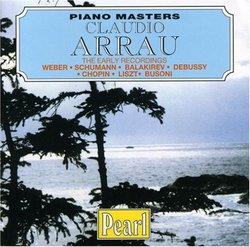| All Artists: Carl Maria von Weber, Robert Schumann, Mily Balakirev, Ferruccio Busoni, Claude Debussy, Igor Stravinsky, Frederic Chopin, Franz Liszt, Claudio Arrau Title: The Early Recordings Members Wishing: 0 Total Copies: 0 Label: Pearl Release Date: 3/28/2000 Genres: Dance & Electronic, Special Interest, Classical Styles: Opera & Classical Vocal, Ballets & Dances, Waltzes, Chamber Music, Forms & Genres, Ballads, Fantasies, Short Forms, Sonatas, Suites, Historical Periods, Classical (c.1770-1830), Modern, 20th, & 21st Century, Romantic (c.1820-1910) Number of Discs: 2 SwapaCD Credits: 2 UPC: 727031007029 |
Search - Carl Maria von Weber, Robert Schumann, Mily Balakirev :: The Early Recordings
 | Carl Maria von Weber, Robert Schumann, Mily Balakirev The Early Recordings Genres: Dance & Electronic, Special Interest, Classical |
Larger Image |
CD Details |
CD ReviewsThe young Claudio Arrau jsa | San Diego, CA United States | 07/19/2009 (5 out of 5 stars) "Much of the material on this 2 cd set hadn't seen the light of day for decades until Gregor Benko's International Piano Library released its seminal double LP of Arrau's earliest recordings in the 1970's. I remember putting the first record on the turntable and wondering, this was Claudio Arrau? What a revelation it was to hear the great maestro toss off Stravinsky's Danse Russe from Petrushka, something that was unimaginable in his later career when Russian music, or anything that remotely smacked of entertainment, had been left behind years before. (The seriousness of music meant that by the 1960's even encores had been dispensed with in Arrau recitals.) And what a tour de force was Balakirev's Islamey and Liszt's Spanish Rhapsody, even though some minor cuts had been made so that it would fit onto the shellac discs of the 1920's. Here too was an exotic Carmen Fantasy from Busoni, who Arrau revered, and a group of dazzling Chopin and Liszt pieces along with Debussy and some other odds and ends. All of these sides, dating from 1928 - 1940, are collected on this set and will make astonishing listening for anyone conditioned by Arrau's Philips recordings which capture an entirely different aspect of the great pianist - an artist who eschewed exhibitionism and whose bardic interpretations, worked out over long periods of time, were the very antithesis of his early approach.
In that 2 cd's can hold a lot more music than 2 LP's, this set also includes the Weber piano sonata no. 1 and, more importantly, Arrau's 1939 recording of Schumann's Carnaval, which was a major breakthrough for him. Indeed a Carnegie Hall appearance two years later, which featured Carnaval, was such a triumph that it firmly established Arrau as an important artist in the United States. While this recording, some of which is executed at breakneak speed, is far more interesting than the stereo version Arrau made for Philips some thirty years later, several of the extroverted "Florestan" pieces are actually played too fast. The pianist must have thought so too, for the Philips reading goes in quite the opposite direction, and ends up lumbering along in many places. There is, however, an outstanding performance of Carnaval that Arrau taped for television in 1961 that's available on a BBC dvd (and youtube) and where his approach is neither too studied, nor too pyrotechnical. Just watching the way Arrau engages the keyboard in this technically demanding music is really a remarkable experience. (My favorite recorded Carnaval is still Rubinstein's RCA disc, made in the early 1960's.) The transfers were presumably made from originals from a private collection. I owned the now unavailable Marston 2 cd set of the same material (since destroyed in a fire so I don't have it for comparison), but still have the impression that the Marston transfers were quieter. Certainly the digitally remastered Islamey that can be found on Arrau's Steinway Legends set sounds much better than this. In any event, these are great documents of a great pianist, and worthy additions to any music library." |
